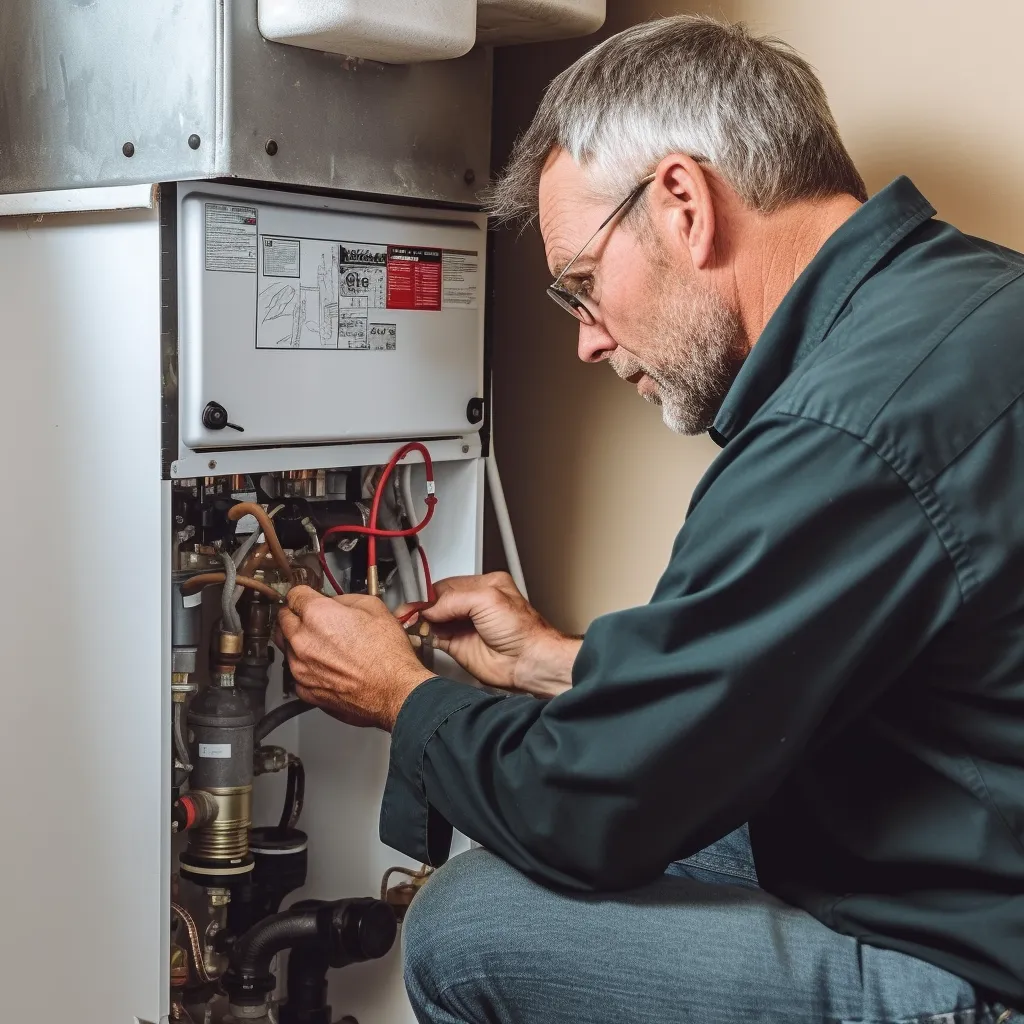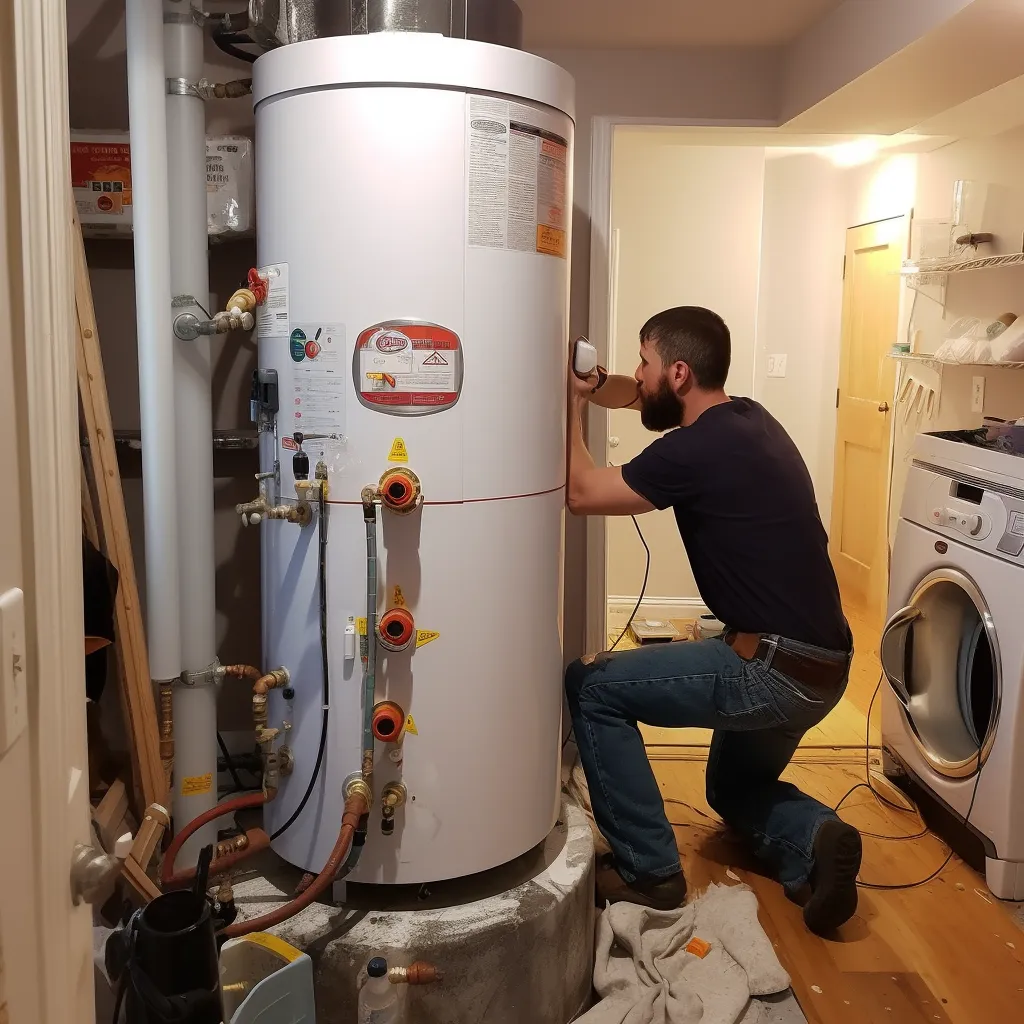Gas vs Electric Water Heater:
Ultimate Las Vegas Comparison
If you're trying to decide between a gas or electric water heater, it's crucial to grasp the fundamental distinctions between the two. This comprehensive article aims to examine the advantages and disadvantages of both options, enabling homeowners to make well-informed decisions tailored to their requirements. By considering factors like energy efficiency and initial expenses, individuals can select the most suitable water heating solution for their needs.

How do electric water heaters work?
An electric water heater functions through the utilization of submerged heating elements housed within a storage tank, drawing power from your home's electrical system. The unit's thermostat constantly monitors the water temperature and automatically deactivates the heating elements once the desired temperature is achieved. This effective mechanism ensures a consistent supply of hot water that is readily accessible for your needs.

Benefits of electric water heaters
When it comes to water heaters, electric models have a clear advantage over traditional gas-powered ones. Here's why:

Enhanced Safety: With electric water heaters, you can bid farewell to the risks associated with gas lines, such as gas leaks and carbon monoxide poisoning. By eliminating the need for gas, these heaters offer a safer option for households.
Versatile Installation: Electric water heaters don't require venting for exhaust gases, granting you the freedom to install them in various locations. This installation flexibility makes it easier to set them up in different areas of your home.
Optimal Efficiency: Electric water heaters boast high energy efficiency, efficiently converting almost all of the electricity they consume into heat. This translates into long-term cost savings on energy bills.
Affordable Upfront Costs: Compared to their gas-powered counterparts, electric water heaters generally come with lower upfront costs. Additionally, they tend to be more affordable when it comes to installation and maintenance.
Environmentally Conscious: By producing zero greenhouse gas emissions during operation, electric water heaters contribute to a greener home. Choosing them aligns with environmentally friendly practices and reduces your carbon footprint.
Long-Lasting Performance: Electric water heaters are known for their durability, often outlasting gas-powered heaters. This longevity ensures a reliable supply of hot water over an extended period, providing peace of mind.
Disadvantages of electric water heaters
Despite the numerous advantages offered by electric water heaters, it is crucial to acknowledge their limitations as well.

One drawback is their slower recovery rate. In comparison to gas models, electric water heaters tend to heat water at a slower pace. Consequently, it may take longer for the water to reach the desired temperature, especially when demand is high.
Energy costs are another factor to consider. Although electric water heaters are generally more energy-efficient, it is important to bear in mind that electricity rates can still contribute to higher energy bills. Thus, when assessing the overall expense, ongoing electricity costs should be taken into account.
In terms of longevity, electric water heaters typically have a shorter lifespan when compared to gas-powered models. As a result, there is a higher likelihood of needing to replace the unit sooner, which can increase long-term costs.
The impact of power outages should be considered. Electric water heaters rely on a continuous supply of electricity to operate. Therefore, during power outages, hot water may not be available until power is restored.


How do gas water heaters work?
Gas water heaters operate by utilizing a gas burner positioned at the bottom of a spacious tank. This burner is responsible for heating the water that is stored within the tank. Whenever hot water is required, it can be easily obtained through a tap. In order to maintain a steady supply of hot water, the tank continuously receives cold water as the hot water is being used. This constant process of heating and replenishment guarantees a reliable and uninterrupted flow of hot water to fulfill diverse household requirements.
Pros of gas water heaters
Gas water heaters offer numerous advantages that make them a preferred choice among homeowners. Here are some of the reasons:

One notable benefit is their cost-effectiveness. Unlike electric units, gas water heaters can lead to significant long-term savings on utility bills. This is primarily due to the affordability of gas as a fuel source, allowing homeowners to enjoy potential cost savings over time.
Another key advantage of gas water heaters is their ability to deliver hot water faster. Compared to electric models, gas water heaters heat water more rapidly, ensuring immediate access to hot water as soon as the tap is turned on. This swift hot water delivery is particularly advantageous for households that require instant access to hot water, providing convenience and efficiency in everyday tasks.
Gas water heaters boast a longer lifespan when compared to their electric counterparts. With their extended durability, homeowners can enjoy the benefits of their gas water heaters for an extended period without the need for frequent replacements. This not only ensures a consistent supply of hot water but also helps save money on replacement costs in the long run.

Cons of gas water heaters
Gas water heaters, despite their numerous benefits, come with certain drawbacks that should be considered:

Environmental impact: One of the main concerns associated with gas water heaters is their contribution to air pollution. Since they rely on burning natural gas, a fossil fuel, the combustion process releases pollutants into the atmosphere. This adds to the existing environmental concerns, making it crucial to address the potential impact.
Risk of explosion: Mishandling gas water heaters can lead to dangerous situations, including the risk of explosions. To ensure safety, it is essential to adhere to proper installation procedures and follow safety guidelines meticulously. Entrusting the installation to a professional is highly recommended, as their expertise minimizes the likelihood of accidents.
Higher maintenance costs: Gas water heaters generally require more maintenance compared to their electric counterparts. This means that additional expenses may be incurred for regular inspections, cleaning, and potential repairs. It is important to factor in these ongoing maintenance requirements when considering the overall costs associated with gas water heaters.
Longer installation time: Installing a gas water heater typically takes more time than installing an electric unit. This is due to the need for setting up gas lines, venting systems, and ensuring proper connections. Allowing for several hours of installation time is crucial to ensure a satisfactory and safe setup.

Are electric water heaters energy-efficient?
The efficiency of electric water heaters can be influenced by several factors, such as the unit size, insulation quality, and operating temperature. Although gas-powered water heaters are generally recognized for their superior efficiency, electric models have made significant strides in enhancing their energy efficiency ratings.

Are gas water heaters energy-efficient?
Gas water heaters are known for their superior cost-effectiveness and energy efficiency when compared to their electric counterparts. These water heaters operate by utilizing natural gas combustion to heat water, resulting in lower energy consumption than electric heaters. The efficiency rating of a gas water heater can be affected by various factors, including the unit's size, model, and maintenance practices.
What does it cost to buy and install electric water heaters?
When it comes to electric water heaters, you'll find a variety of sizes and features to choose from, which directly impacts their costs. A 50-gallon electric water heater, for instance, usually falls within the price range of $300 to $800. However, it's worth noting that the overall cost of installation adds an extra expense to consider. On average, you can expect to pay around $300 to $500 for the installation of an electric water heater. Keep in mind that these installation costs may vary depending on the specific requirements of the project and any necessary permits.


What does it cost to buy and install gas water heaters?
Gas water heaters are available in various sizes, with prices typically ranging from $500 to $1,500. High-end models can even reach up to $3,000. Keep in mind that installation charges may apply, and these can vary based on your location and specific plumbing requirements. While the initial cost may seem higher, it's essential to consider the long-term advantages and savings. Gas water heaters are known for their superior energy efficiency, resulting in reduced utility bills over time. Moreover, they offer a reliable and uninterrupted supply of hot water, which is particularly advantageous for households with substantial hot water usage. Invest in a gas water heater today to experience these benefits firsthand.

Maintenance needs of electric water heaters
To guarantee dependable and secure performance, proper upkeep plays a vital role in electric water heaters. Essential maintenance practices include regular monitoring of the temperature and pressure relief valve to avert overheating and the risk of explosions. The tank should be flushed every six months to a year to eliminate sediment accumulation, promoting optimal efficiency. Furthermore, inspecting the heating elements for damage or mineral buildup is crucial, and timely replacement is advised. Lastly, ensuring secure and intact electrical connections is essential for safe operation. If you have any uncertainties about performing maintenance tasks, it is advisable to consult a licensed professional for assistance.

Maintenance needs of gas water heaters
Regular maintenance is crucial to guarantee the efficient and safe functioning of gas water heaters. It is imperative to perform various tasks to ensure their optimal operation. Flushing the tank on a yearly basis, inspecting the anode rod every few years, and monitoring the burner and pilot assembly for any signs of debris or damage are essential steps. Additionally, it is important to test the temperature and pressure relief valve annually and check for gas leaks. By diligently carrying out these maintenance tasks, you can ensure that your gas water heater operates effectively and safely. If you have any uncertainties or concerns, it is highly advisable to consult a licensed professional.


Safety considerations of electric water heaters
To ensure a secure environment while utilizing an electric water heater, safety measures should be the foremost priority to minimize potential dangers. Among the significant concerns is the threat of electrocution, which can arise from inadequate grounding or equipment malfunction. Additionally, fire hazards can occur if the water heater overheats or is positioned in close proximity to flammable substances. To mitigate these risks effectively, adhering to the manufacturer's guidelines and seeking the expertise of a licensed professional for installation is highly recommended. By diligently following these precautions, you can guarantee a secure and dependable operation of your electric water heater.

Safety considerations of gas water heaters
Ensuring safety is of utmost importance when utilizing gas water heaters. It is highly recommended to optimize the security measures in place by incorporating a carbon monoxide detector in close proximity. Regular inspections and maintenance routines should also be followed to guarantee the heater's optimal functionality. Additionally, maintaining a clear and unobstructed surrounding area, devoid of any flammable materials, is crucial. Implementing these essential precautions will significantly contribute to creating a safe and secure environment within your household.

How to choose between electric vs gas water heater
By considering these factors, you can make an informed decision about the most suitable type of water heater for your needs.
To begin, assess the capacity of the water heater based on the size of your household and the frequency of hot water usage. This will help you determine the appropriate size for your needs.
Next, compare the initial purchase and installation costs of electric and gas water heaters. While gas heaters may offer long-term cost savings due to their efficiency, electric heaters have the advantage of lower upfront expenses.
Efficiency is an important consideration as well. Gas water heaters tend to be more energy-efficient and cost-effective to operate compared to electric models. This efficiency can translate into reduced energy consumption and lower utility bills over time.
Maintenance requirements should also be taken into account. Electric water heaters generally require less maintenance, making them a convenient option. On the other hand, gas heaters need regular inspections to ensure safety and prevent malfunctions, so factor in the additional maintenance tasks.
Consider the environmental impact of your choice. Electric water heaters produce fewer emissions and have a lower carbon footprint compared to gas water heaters. If reducing your environmental impact is a priority for you, an electric water heater might be the more environmentally friendly choice.
Choosing the right water heater for your home depends on several important factors, including your personal preferences, lifestyle, and budget. To make an informed decision, it's crucial to consider key aspects such as energy efficiency, installation costs, maintenance requirements, and the availability of fuel sources in your area. Additionally, evaluating your hot water needs, long-term cost savings, and specific environmental concerns is essential. By carefully considering these factors, you can select a water heater that not only matches your priorities but also guarantees a consistent and dependable supply of hot water for your household. Make a well-informed choice that suits your requirements and ensures optimal comfort in your home.

Why you should hire a licensed professional
to install your water heater
When it comes to installing or replacing a water heater, it's crucial to proceed with care. While saving money through a DIY approach may seem tempting, it can be hazardous and risky. For this task, it is strongly advised to enlist the services of a licensed and skilled professional. With their expertise, knowledge, and experience, they can ensure a safe and correct installation. By placing your trust in a professional, you can rest assured that safety protocols will be adhered to and any possible problems will be resolved. Always prioritize your safety, and making the wise and responsible decision of hiring a licensed professional is the way to go.


Be sure to do your research
Conducting extensive research is crucial if you're in the market for a new water heater. Electric and gas water heaters have distinct advantages and disadvantages. Furthermore, it is vital to consider safety concerns and installation prerequisites. By diligently evaluating these factors, you can discover the perfect water heater that meets your requirements. Nonetheless, it is essential to highlight the importance of engaging a licensed expert for the installation process. Their specialized knowledge will ensure the secure and efficient operation of your water heater.
Contact Us
GET IN FULL TOUCH
PHONE:+(702) 935-6990
EMAIL:
stephen@waterheaterlasvegas.com
Las Vegas, NV 89183
